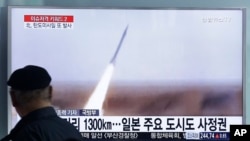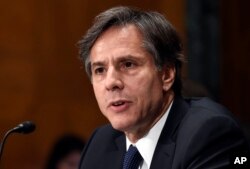North Korea’s ongoing nuclear and missile tests are a “profound threat” to regional stability, U.S. Deputy Secretary of State Antony Blinken said Tuesday.
He said China, Pyongyang’s economic lifeline, is among the U.S. regional allies that share an interest in seeing North Korea get on a path to denuclearization.
“Unfortunately, the most effective way to achieve that,” said Blinken, “is to exert real pressure on North Korea and force it to make a choice.”
He said the choice is between continuing its actions and choosing a path that would allow it to “provide for its own people and develop economically.”
Blinken commented at a Washington forum ahead of President Barack Obama’s talks on the issue this week with his counterparts from Asia.
Obama will hold three-way talks Thursday with Japanese Prime Minister Shinzo Abe and South Korean President Park Geun-hye on the sidelines of a global nuclear security summit in Washington. He will meet separately with Chinese President Xi Jinping.
North Korea stepped up its provocative actions and rhetoric following this month’s start of an annual U.S.-South Korea military drill, which Pyongyang considers a threat. It has launched a series of short- and medium-range projectiles since the drill got underway.
On Tuesday, South Korea said the North had fired a short-range projectile from its east coast. It has also threatened retaliatory nuclear action against Seoul and Washington.
North Korea also appears to be reacting to new, tougher U.N. sanctions imposed this month, following a January nuclear test and a February rocket launch.
“This round of sanctions is the first real serious set of sanctions” against Pyongyang, said Richard Bush, director of the Center for East Asia Policy Studies at the Brookings Institution, a Washington research and policy group. “We need time for them to play out and to really exert pressure on the leaders of North Korea to deprive the leaders of North Korea of things that they hold dear.”
Anti-missile system
Separately the U.S. and South Korea have begun consultations on the possible deployment of THAAD, a U.S-made anti-missile system.
China opposes deployment of the system, saying it could undermine its security interests. The system "does not affect China strategically, but we know that China does not like it,” Blinken said.
Blinken added that current and former U.S. administrations had made repeated efforts to engage North Korea about denuclearization and had made it clear that the U.S. was not seeking regime change.
“The agreement with Iran on its nuclear program should be powerful evidence to North Korea that we are prepared to engage with countries with whom we have the most profound differences,” he said.
The United States, China, South Korea, Russia, Japan and North Korea were participants in six-party talks aimed at curbing Pyongyang's nuclear weapons program. The talks broke down in 2008.
Richard Green contributed to this report.














